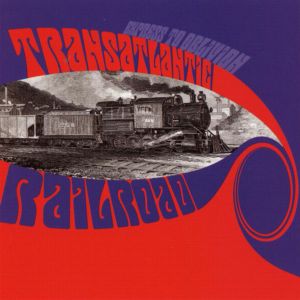
- Format: MP3

Though it did not lead the band to stardom, where they were bound to go, Transatlantic Railroad did offer an unforgettable West Coast ride on a "meta-journeys to unimagined places".
The good thing is that now the ride will go on forever, thanks to this release.
Coming from the sixties' "fruity" Frisco bay area, they were often referred to as "the next great San Francisco music scene band" which is what they had remained too, supposedly because of "one band member's inflexibility". The seven songs on this album are more than enough a proof of their potential, so an explanation like this is the only reasonable one.
Transatlantic Railroad were some kind of an amalgamation of all the good, heard in the music of the local scene ... and wider. The set opens with the musical omnibus Camp Towanga, sounding like Moby Grape fronted by Greg Allman, along with his Hammond organ, with Peter Green steppin' in for a guitar solo during the '50s ballad-like middle eight, and it's followed with another Southern-jam, Fred Chicken Blues reminding of the Statesboro one.
Tahoma Street Song, recalls Quicksilver's best moments, Elephant is a quirky, Door-opening psych, with a 10 minute-looooong jam, Old English 800 is a very un-English "spoonful" of blues, their single's b-side Irahs explores the C&W segment of the American tradition (think Moby Grape's It's No Use) and, along these '67/'68 recordings, as a bonus, you get one of the 1966 efforts from their early 'Brummels-like phase, called Good Times, that could've easily pass as an unreleased studio track by the mentioned fellow S.F.folk rockers.(cdbaby.com)
Transatlantic Railroad was one of many late-'60s San Francisco psychedelic bands that did their share of live work in the region but barely recorded, remaining known almost exclusively to those who saw them play. Based on the material that showed up in the early 2000s on the archival release Express to Oblivion, their talent was such that it didn't absolutely demand a record release. Still, their bluesy psychedelia, heavy on guitar soloing and organ as well as unpredictable multi-sectioned original compositions, was representative of the second or third division of northern California psychedelic bands of the era. The group formed at San Rafael High School in Marin County in 1965, and on its first show opened for the Grateful Dead, the night the Dead changed their name from the Warlocks. A couple of unreleased 1966 tracks in a garage-folk-rock style showed up about 30 years later on the '60s Bay Area rarities compilation What a Way to Come Down. Like many other groups from the area, Transatlantic Railroad moved into a harder psychedelic style shortly afterward, and released just one single, "Why Me"/"Irahs," on the Sire subsidiary Phoenix in 1968. They also started work on an album, but it was abandoned after five demos. It's been reported (in the psychedelic rock reference book Fuzz Acid & Flowers) that this came about when Geoff Mayer's large Hammond RT-3 organ wouldn't fit through the doors of the studio, and Mayer was unwilling to use other equipment. Also according to the volume, the five completed demos can be heard on Express to Oblivion, which also has a couple of other lighter, less psychedelia-inclined tracks. After the group broke up in the early '70s, guitarist and lead singer Kent Housman recorded or performed with Blue Cheer, the Ducks, and SFO. (AMG)